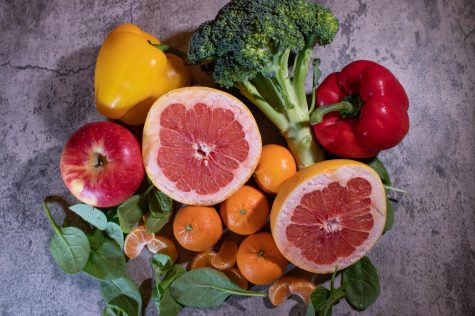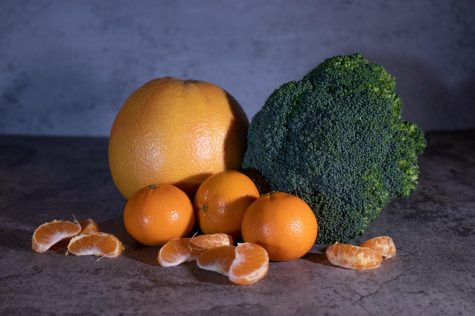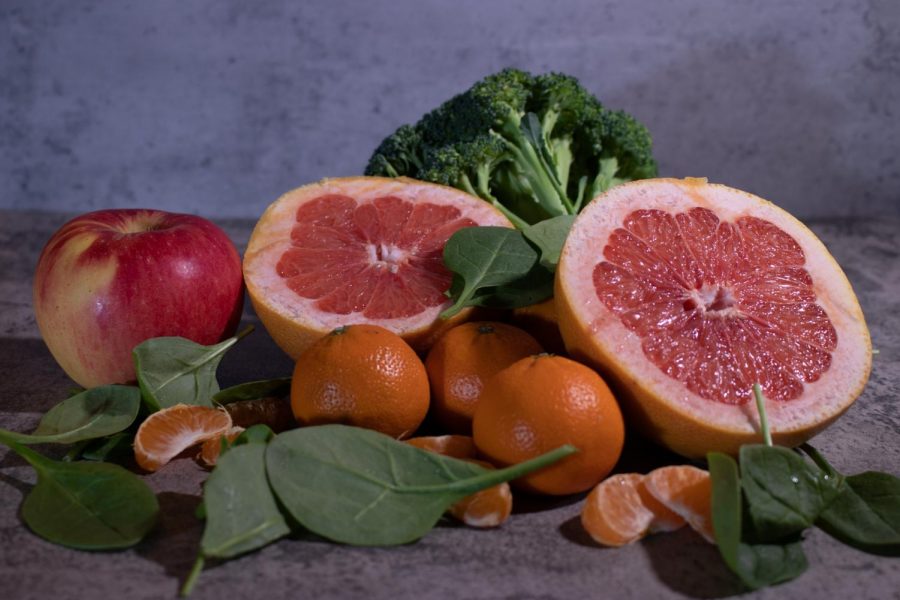Help boost your immune system with these nutritious foods
By Kayla Jones, OMN Photographer
Grapefruit, broccoli, bell peppers, oranges, apples and spinach are among some of the foods that can help boost your immune system.
December 12, 2021
The cold and flu season is in full swing. If a hacking cough and a nasty sneeze frighten you, you may be longing for immune-boosting products. Looking for ways to strengthen your immune system to prevent cold and flu this season? We got you covered!
As Corvallis, Ore. gets colder and the rain persists, the weather increases the risk of catching viruses that challenge our immune system. Colds, coughs, flu and infections become more common, so we need to strengthen immunity to avoid and fight seasonal illness. Something as simple as including certain nutritious foods in your diet may help to boost your immune system.
According to Dr. Nancy Lach, a chiropractic physician who focuses on holistic healing in Corvallis, it is critical to eat plenty of fruits and vegetables to maintain your health. These foods give our body life, as nature intended to nourish, rebuild, and support us physically, mentally, emotionally and spiritually. The many colors in these foods represent the crucial nutrients required for vitality in our bodies.
“The body’s immune response requires many micronutrients,” said Theresa Hedrick, a Registered Dietitian Nutritionist in Corvallis. “No one food or supplement can keep you from getting sick because no one food contains all of the micronutrients your immune system needs. But you can support your immune system by eating a variety of nutritious foods on a regular basis.”
It is very important to choose carefully what we consume, especially when we are sick.
“We often have less of an appetite when we are ill, so it is always best to prevent illness through proper diet,” Dr. Nancy said. “Once we are sick, staying hydrated is most important. Drinking hot water with lemon or other citrus is wonderful for us. Adding honey is a good option.”
Dr. Nancy advised trying herbal teas and coconut water as well. Caffeine dehydrates the body so it is best to avoid or minimize it when sick. Eating foods high in vitamin C is a great way to help our body recover. These include oranges, tangerines, grapefruit, peppers, broccoli, winter squash and tomatoes. Squeezing lemon, lime or orange into water adds vitamin C, thus adding to its benefits.

“Aim for at least five servings of different colored fruits and vegetables a day to get that variety,” Hedrick said. “Vitamins and minerals like vitamin A, vitamin B6, vitamin B12, vitamin C, vitamin D, vitamin E, zinc, copper, folate, selenium and iron all play a role in immune response.”
There are some natural foods that can enhance our immune system. According to Dr. Nancy, some foods that are particularly good for our immune system are: citrus fruits, apples, bananas, potatoes, cruciferous vegetables (broccoli, cabbage, brussel sprouts, cauliflower) cucumber, leafy greens, onions, garlic and ginger.
“Protein is also important for healing and recovery,” Hedrick said.
According to Sarah Klemm in the article, Support Your Health With Nutrition, consuming protein-rich foods such as fish, lean meat, poultry, eggs, beans and peas, soy products and unsalted nuts and seeds are good for healing and recovery and contribute to the body’s immunological system.
There are distinctions between taking vitamin supplements and eating healthy meals, both of which contribute to boosting the immune system.
According to Dr. Nancy, in terms of efficacy, side effects and future bodily health—high quality, preferably food or herb-based supplements, can greatly facilitate the healing process. This is because they contain concentrated nutrients that can be taken easily.
According to Hedrick, eating a diet that lacks one or more of these nutrients can hamper the production and function of immune cells and antibodies. Getting these nutrients from food is preferred. A vitamin and mineral supplement can fill in the gaps if your diet is not well-balanced. More is not always better; large doses of nutrients can have harmful side effects, Hedrick added. For example, mega-doses of zinc may actually suppress the immune system.
“There are also many healing herbs, such as echinacea, goldenseal, cat’s claw, and lemon balm that we typically do not include in our diet,” Dr. Nancy said. “It is best to work with a health practitioner who carries professional-grade, whole-food supplements and can personalize your supplements. Synthetic vitamins that are available in many stores can cause imbalance in the body.”
When choosing foods such as unhealthy snacks and beverages containing sugar, keep in mind that they can weaken our immune system.
According to Dr. Nancy, there are certain food groups that weaken the immune system and therefore should be at least minimized to prevent illness and avoided while sick. Dairy is most important to avoid since it creates mucus in the body. Along with dairy, other foods that stress the immune system and provide fuel for pathogens (viruses, bacteria, fungus and parasites) are refined sugar, fried foods and “junk food.”
“The top five foods to avoid are: dairy, eggs, corn, wheat and canola oil,” Dr. Nancy said. “Avoiding these are recommended since pathogens feed off these foods. Focusing on fruits and vegetables, along with healthy whole grains and good quality protein such as wild caught salmon is your best bet for maintaining optimal health. Reading ingredients is important in order to take responsibility for what you are putting in your body.”
According to Jillian Kubala in the article, 10 Foods That May Weaken Your Immune System, fast food and heavily-processed food diets may promote inflammation, gut permeability and induce bacterial imbalance in the gut, all of which can harm our immunological system. Bis(2-ethylhexyl) phthalate (DEHP), and diisononyl phthalate (DiNP) are two forms of phthalates that may be present. Phthalates can enter fast food from packaging or plastic gloves used during food preparation, for example. Phthalates are believed to be associated with our body’s endocrine system, which produces hormones. They may also cause an increase in the synthesis of inflammatory proteins, which can decrease our immunological response to infections and create immune dysregulation.
According to Harvard T.H. Chan School of Public Health, a probiotic and prebiotic-rich diet may be advantageous. Prebiotic meals contain fiber and oligosaccharides that nourish and sustain healthy colonies of beneficial bacteria, whereas probiotic foods that contain live beneficial bacteria. Probiotic foods include, for example, kefir, yogurt containing live active cultures, fermented vegetables, sauerkraut, tempeh, kombucha tea, kimchi and miso. Prebiotic foods include garlic, onions, leeks, asparagus, Jerusalem artichokes, dandelion greens, bananas and seaweed. However, for dietary prebiotics, a more main guideline is to consume a mix of fruits, vegetables, legumes and whole grains.

Aside from consuming the nutritious foods above, we can also maintain our immune system’s health in other ways.
According to Emily Faltesek, a Registered Dietitian Nutritionist at Oregon State University’s Food Security Programs Manager, if nutrient intake is balanced and nutrients are not missing from the variety of foods in a person’s eating, then adequate nutrition is supporting body function in regard to immunity. There isn’t a food or vitamin, though, that one can consume in quantities above what is needed to make up for other areas of health behaviors that might harm immunity such as not getting enough sleep, too high stress or not washing our hands.
“I mostly understand the body to be a complicated system working with many parts to support an individual’s health,” Faltesek said. “Sleep, stress management, exercise, nutrition, risk management (like handwashing, staying away from people who are sick when possible, wearing a mask, getting a flu vaccine), presence of chronic health conditions, structural inequalities that might place individuals in higher risk situations or limit food access, and luck all play a role in immunity too.”
To strengthen our immune system, a well-balanced diet rich in whole, nutrient-dense foods, as well as restricting our consumption of ultra-processed foods need to be part of our daily routine, in addition to maintaining a healthy lifestyle and good hygiene.
“Minimize stress, exercise regularly, get adequate rest and sleep,” Dr. Nancy said. “Our mental state is also key to a healthy immune system, so staying positive through an attitude of gratitude, focusing on nature, time away from electronics, quality time with friends, enjoying hobbies, etc. are important for keeping yourself balanced and happy. This has a profound effect on our immune system!”


















